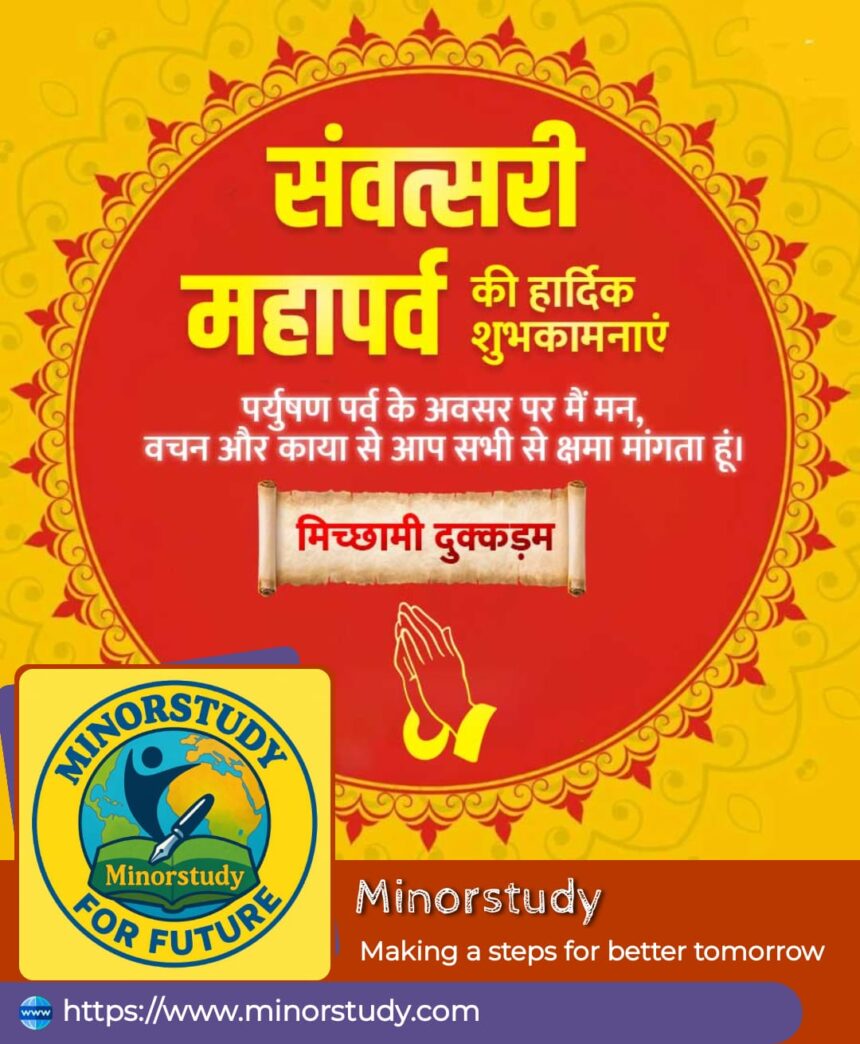Samvatsari Mahaparva Brings Peace and Forgiveness in Life
Introduction
Among the many sacred festivals celebrated in India, Samvatsari Mahaparva holds a unique place. Known as the “Festival of Forgiveness”, it is the holiest day of the Jain community, observed on the last day of Paryushan Parva. On this day, Jains seek forgiveness from family, friends, neighbors, colleagues, and even strangers with the heartfelt phrase:
- History of Samvatsari Mahaparva
- Timeline of Samvatsari Mahaparva
- Facts About Samvatsari Mahaparva
- Significance of Samvatsari Mahaparva
- Daily Life Impacts of Samvatsari
- Observance of Samvatsari Mahaparva
- Importance in Society
- Wishing Messages for Samvatsari Mahaparva
- FAQs About Samvatsari Mahaparva
- Conclusion
“Micchami Dukkadam” – which means “If I have caused you hurt knowingly or unknowingly, in thought, word, or deed, I ask for your forgiveness.”
In a world full of stress, misunderstandings, and conflicts, this festival reminds us of the power of humility, compassion, and reconciliation. Let us explore its history, timeline, facts, significance, daily life impacts, observance, FAQs, and its importance in society in detail.
History of Samvatsari Mahaparva
The roots of Samvatsari lie in the teachings of Lord Mahavira, the 24th Tirthankara of Jainism. He emphasized Ahimsa (non-violence), Satya (truth), and Kshama (forgiveness) as the pillars of a spiritual life.
Samvatsari is celebrated at the end of the Paryushan festival (8 days for Shvetambar Jains, 10 days for Digambar Jains). On this day, devotees perform Pratikraman – an act of repentance and reflection on one’s actions throughout the year.
The tradition highlights the belief that forgiveness not only purifies the soul but also builds harmony in society.
Timeline of Samvatsari Mahaparva
6th Century BCE – Lord Mahavira preaches forgiveness as a core virtue.
Medieval Period – Jain monks spread the practice of collective Pratikraman and Samvatsari.
Modern Era – Samvatsari becomes a widely observed festival among Jains worldwide, often extending the message of forgiveness to people of all faiths.
21st Century – “Micchami Dukkadam” messages spread globally through social media, emails, and digital platforms.
Facts About Samvatsari Mahaparva
It is the last and most important day of Paryushan Parva.
Both Shvetambar and Digambar sects observe it with slight variations.
Forgiveness is asked not only from humans but also from animals, nature, and even microorganisms.
The greeting “Micchami Dukkadam” has become a cultural expression of peace and friendship.
On this day, strict fasting, meditation, and prayers are observed.
The festival symbolizes universal brotherhood.
It has a strong psychological benefit – releasing guilt, anger, and grudges.
Significance of Samvatsari Mahaparva
Forgiveness Heals the Heart: Letting go of anger brings peace.
Spiritual Purification: Asking and giving forgiveness purifies karma.
Strengthens Relationships: Families reconcile and rebuild love.
Promotes Non-Violence: Reminds us of compassion toward all beings.
Universal Message: Applies to all faiths, not just Jains.
Reduces Ego: Saying sorry requires humility.
Mental Peace: Releases stress and negativity.
Social Harmony: Encourages tolerance and kindness.
Divine Blessings: It is believed that forgiving brings spiritual upliftment.
Daily Life Impacts of Samvatsari
At Home: Brings peace among family members, resolving year-old disputes.
At Workplace: Encourages teamwork by reducing ego clashes.
In Society: Inspires people to live with more compassion.
In Personal Life: Improves mental health by reducing grudges.
Spiritually: Strengthens the soul by practicing self-reflection and forgiveness.
Observance of Samvatsari Mahaparva
Pratikraman: Jains perform self-reflection, confess mistakes, and repent.
Fasting: Many observe complete fasting or eat only boiled food.
Prayer & Meditation: Chanting mantras and meditating on forgiveness.
Asking Forgiveness: Saying “Micchami Dukkadam” to everyone.
Charity (Daan): Offering help to the needy and spreading kindness.
Importance in Society
Samvatsari goes beyond religion – it has a universal message of forgiveness and peace. In today’s world of conflicts and misunderstandings, this festival teaches us:
To apologize without ego.
To forgive without conditions.
To heal relationships and promote harmony.
To live with compassion and kindness.
It is not just important for Jains but for the whole of humanity.
Wishing Messages for Samvatsari Mahaparva
🌸 “On this Samvatsari, may forgiveness light your soul with peace. Micchami Dukkadam!”
🌸 “If I have hurt you knowingly or unknowingly, I ask for your forgiveness. Happy Samvatsari!”
🌸 “May this holy day of Samvatsari bring love, peace, and harmony to your life.”
🌸 “Let us let go of grudges and start afresh with kindness. Micchami Dukkadam!”
FAQs About Samvatsari Mahaparva
Q1. Why is Samvatsari called the Festival of Forgiveness?
Because it is dedicated to asking and granting forgiveness for all mistakes done in the past year.
Q2. What is the meaning of “Micchami Dukkadam”?
It means: “If I have hurt you by thoughts, words, or deeds, knowingly or unknowingly, please forgive me.”
Q3. How do Jains observe Samvatsari?
By fasting, praying, performing Pratikraman, and seeking forgiveness.
Q4. Is Samvatsari only for Jains?
While rooted in Jainism, its message of forgiveness is universal.
Q5. What is the spiritual benefit of Samvatsari?
It purifies the soul, reduces karmic bondage, and promotes inner peace.
Conclusion
Samvatsari Mahaparva is not just a religious festival – it is a spiritual movement of forgiveness. By saying “Micchami Dukkadam,” we not only seek pardon but also give others the chance to heal. In this way, it uplifts both individuals and society.
In a time when anger, ego, and conflicts dominate our lives, Samvatsari reminds us of the power of compassion and humility. It encourages us to forgive, to let go, and to embrace peace.
✨ So, as the Jain community beautifully says – “Micchami Dukkadam”. If knowingly or unknowingly, I have hurt you in any way, I sincerely seek your forgiveness.








